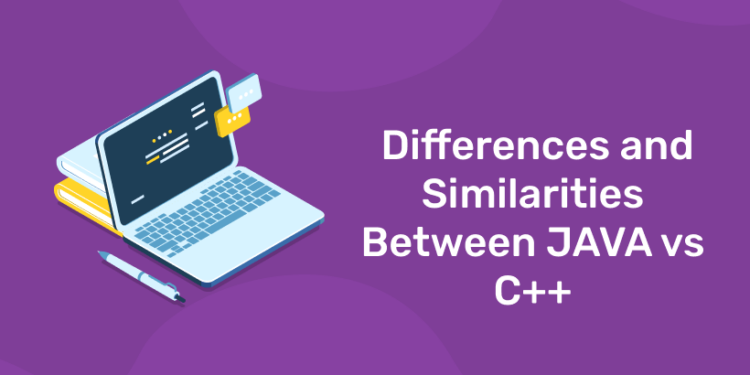Table of Contents
Java and C++ programming languages are vastly used in competitive coding nowadays. Due to some amazing features, these two programming languages are widely used in enterprises as well. C++ is a widely prevalent language among coders for its efficiency, high speed, and dynamic memory utilization. Java is greatly used in the IT industry, It is incomparable to any other programming language in terms of software development.
Learn to code from industry experts! Enroll here!
Java – An Overview
Initially developed by James Gosling at Sun Microsystems (now acquired by Oracle), Java is one of the most manifold languages of today’s time. Employed by hundreds of Software Companies and millions of developers all around the globe, Java has become the most widespread language which is used to build software applications to solve real-world problems. Java is a high-level object-oriented programming language that is designed to have as few execution dependencies as possible. Java supports the feature of WORA – Write Once Read Anywhere. In other words, assembled Java code can run on all platforms that support Java without the requirement for recompilation.
Java also has support for a lot of features that improve a developer’s powers to develop scalable applications. Certain classes like Applets, Servlets, JavaServer Pages, etc. make the development of applications more comfortable. Also, Java has a lot of frameworks created on top of it like Spring, Dagger, etc. which helps developers to work seamlessly.
Now that we know about what CPP and Java are, let us, deep-dive, into the distinction between the two languages, that is, let us take a look at C++ Vs Java in terms of various characteristics.
C++ – An Overview
1: Which of the following data structures allows elements to be added and removed in a Last-In, First-Out (LIFO) order?
One of the most prevalent programming languages in a variety of fields like Game engines, high-frequency trading, etc. is C++. It is a semi-object-oriented programming language that was created by Bjarne Stroustrup as an extension of the already existing programming language C. C++, also popularly known as ‘C with classes’, has grown and diversified a lot over time and is executed as a compiled language. C++ has found its usage in a lot of big Software Companies like Microsoft, IBM, etcetera and can be employed to develop desktop applications, video games, servers, for instance, E-Commerce, web search and databases, and high-performance applications, for instance, telephone switches, space probes, etc.
C++ has support for a lot of components like object-oriented principles, for example, Inheritance, Encapsulation, Polymorphism (both static and dynamic), etcetera. But a C++ code can be assembled even without having classes or creating objects. Hence, it is rightly termed as a semi-object-oriented language.
Some of the features that C++ has to offer are as follows:
- Static and Dynamic Memory allocation:In C++, both static and dynamic allocation is feasible. This implies that C++ allows the users to allocate memory to variables, objects, etc., both at compile time(static memory allocation) and at run time (dynamic memory allocation). Dynamic memory allocation can be completed with the usage of malloc(), calloc(), realloc(), etc. functions.
- Creation of Templates: C++ templates are employed to implement generic programming. Templating means creating a generic function, class, etc. that would perform a distinct task for more than one data type.
- Operator Overloading: C++ has support for operator overloading, that is, assigning a meaning to a particular operator other than what it is usually employed for. For instance, the addition operator (‘+’) of C++ is generally used to add two numbers, be it integer or fractional values. Yet, it can be overloaded to concatenate two strings or add two Complex Number objects also.
- Lambda Functions: There is support delivered by C++ for anonymous functions, popularly known as lambda expressions. The syntax of lambda functions is given below:
- Exception Handling: To debug any kind of error and also to make code tamper-free, C++ delivers support for exception handling through the use of the ‘try’, ‘catch’, ‘final’, etc. keywords.
Learn Coding in your Language! Enroll Here!
Build Better, Together. 🛠️ Join the Entri Coding Community!
Beyond syntax, there’s strategy. 🚀 Join our subreddit for: Exclusive Coding Roadmaps 📍,Project Case Studies 📂 ,Interview Prep Tips 💡and more
👉 Join our Reddit communityDifferences Between C++ and Java
Let’s go through the different points to compare these two popular coding languages:
| Parameter | C++ | Java |
| Relationship | No rigid relationship between class names and filenames. In C++, header files and execution files are used for a specific class. | The rigid association is enforced, e.g., the source code for class PayRoll has to be in PayRoll.java. |
| Input mechanism | I/O statements operate in and cout, e.g., in » x; cout« y; | I/O input mechanism is quite complicated as it reads one byte at a time (System.in). Output is easy, e.g. System.out.println(x); |
| Compiler and Interpreter | C++ only supports compiler | Java supports both compiler and interpreter |
| Compatibility with other languages | Compatible with C source code, except for some exceptional cases. | No backward compatibility with any previous language. The syntax is influenced by C/C++. |
| Access control and object protection | A flexible model with constant protection available | The cumbersome model encourages weak encapsulation. |
| Concept | Write once compile anywhere | Write once run anywhere everywhere |
| Support for programming type | Permits both procedural programming and object-oriented programming. | Support object-oriented programming model. |
| Interface | Permits direct calls to native system libraries. | Only call via the Java Native Interface and newly Java Native Access. |
| Memory management | Accessible to programmer | System controlled |
| Root hierarchy | C++ there is no such root hierarchy. C++ supports both procedural and object-oriented programming; thus, it is called a hybrid language. | Java is a refined object-oriented programming language. That’s. Why It follows single root hierarchy. |
| Best features | C++ supports Object-oriented elements Procedural programming elements. | Java support automatic garbage collection. It does not sustain destructors as C++ does. |
| Goto Statement | C++ has a goto statement. Although, it is not perfect to use a goto statement. | Java has no goto statement. The keywords got, and const is devoted even if they are not used. |
| Multiple inheritance | C++ provides multiple inheritances. The keyword virtual is used to settle problems during multiple inheritances if there are any. | Java doesn’t provide multiple inheritances. |
| Scope resolution operator | C++ has a scope resolution operator (: 🙂 which is utilized to define a mode outside of a class and to access a global variable within the scope where a local variable also exists with the same name. | No scope resolution operator (: 🙂 in Java. The method definitions have to occur within a class, so there is no need for scope resolution. |
| Supporting method | C++ supports both method overloading & operator overloading | Java only supports method overloading. It does not supply aid for operator overloading. |
| Portability | The source must be recompiled for the platform; hence the code is not portable. | Bytecode classes are transferrable to platform-specific JVM’s. |
| Type semantics | Consistent between primitive and object types. | Differ for primitive and object types. |
| Libraries | Predominantly low-level functionality | Massive, classes for high-level services. |
| Runtime error detection | Programmer responsibility. | System Responsibility. |
| Functions & Data | Functions and data may exist external to any class, global and namespace scopes are available. | All function and data exist within classes; package scope are unrestricted. |
| Platform | C++ programs are platform dependent. They need to be compiled for a particular platform. | Java programs are platform independent. Java programs are written for Java Virtual Machine (JVM). It will run without needing recompilation. |
| Runtime error detection | In C++, It is Programmer commitment to check the errors. | It is system responsibility to check error in the program. |
| Pointer | C++ support pointers. | Java offers only narrow support for pointers. |
| Structure | It supports structures. | It does not any support for structures. |
| Unions | C++ supports unions. | Java does not support unions. |
| Object management | C++ supports manual object management with the help of new and delete keywords. | Java is heavily dependent on automatic garbage collection. It does not support destructors. |
Similarities between Java and C++
- Execution:At compile-time, Java source code or .javafile is transformed into a bytecode or .class file. At runtime, JVM (Java Virtual Machine) will load the .class file and will restore it to machine code with the help of an interpreter. After compilation of method calls (using Just-In-Time (JIT) compiler), JVM will manage the optimized code. So Java is both assembled as well as an interpreted language.
On the other hand, C++ executes the code by operating only a compiler. The C++ compiler compiles and transforms the source code into machine code. That’s why C++ is faster than Java but not platform-independent.
Below is the illustration of how Java and C++ codes are executed:
- Features:C++ and Java both have several Object Oriented programming elements which deliver many reasonable programming functionalities. Some elements are supported by one and some by the other.
Below are the details which indicate the features supported and not supported by both the programming languages:
- Applications:Both C++ and Java have extensive areas of application. Below are the applications of both languages:
- Applications of C++ Programming language:
- Appropriate for Developing large software (like passenger reservation system).
- MySQL is written in C++.
- For immediate performance, C++ is majorly operated in Game Development.
- Google Chromium browser, file system, cluster data processing are all designed in C++.
- Adobe Premiere, Photoshop, and Illustrator; these prevalent applications are scripted in C++.
- Advanced Computations and Graphics- real-time physical simulations, high-performance image processing.
- C++ is also employed in many advanced kinds of medical equipment like MRI machines, etc.
- Applications of Java Programming language:
- Desktop GUI Applications development.
- Android and Mobile application development.
- Applications of Java have implanted technologies like SIM cards, disk players, TV, etc.
- Java EE (Enterprise Edition) provides an API and runtime environment for running large enterprise software.
- Network Applications and Web services like Internet connection, Web App Development. 2. Environment:C++ is Platform dependent while Java is a platform-independent programming language. We have to write and run C++ code on the same platform. Java has the WORA (Write Once and Run Everywhere) quality by which we can write our code in one platform once and we can run the code anywhere.
Through this article, we would like to mention that both the languages are used by an oversupply of big Software Companies and therefore, learning both of them could demonstrate to be extremely useful.
For people looking forward to taking a job in the Software Industry, or already have a Software Engineering Job, it is more useful to learn more about Java because of the diversity and flexibility it offers. However, for people looking to work on constructing operating systems, gaming engines, etc. where high performance is needed, C++ can turn out to be a more pleasing programming language than Java as it is way faster than Java. The ENTRI Learning App will assist you to prepare notes regarding Java and all software-related topics well.











